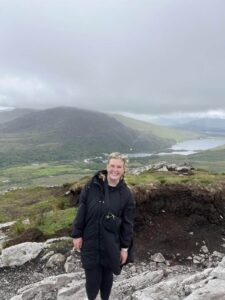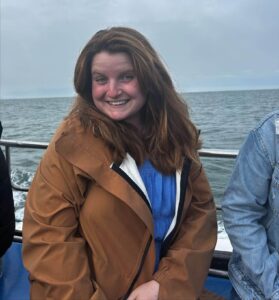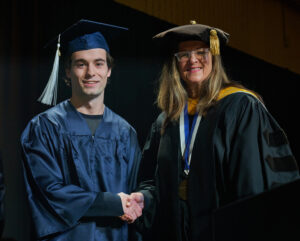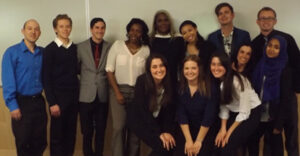News
Teagan Mayr and Sophia Heslep, both minors in civic and community engagement, and both graduating in May 2025, traveled to Ireland last summer.
Teagan, majoring in political science and broadcast journalism, traveled as a Perreault Fellow to intern with Think-tank for Action on Social Change (TASC). Learn more about Teagan’s experience.
Sophia, an education policy major, took part in an education abroad program, “The Culture of Deliberative Democracy in Ireland,” CAS 299H. Learn more about Sophia’s experience.
Both Teagan and Sophia used their Ireland work as their supervised field experience requirement for the minor, and then extended their learning to complete the minor’s capstone, during fall 2024.
Teagan’s capstone consisted of a paper titled, “Influential factors for youth development leading to civic engagement in Ireland and the United States – a comparison.” In her work, Teagan examined 6 key childhood influences that play a role in determining their degree of civic engagement: family, education, economy, social, youth programs, and global. Teagan also built a website based on the paper to more easily share her work.
Sophia was captivated by the political acumen and engagement of Irish citizens, and used her capstone paper titled “The possibilities of democracy: how Ireland can teach the United States a Lesson” to articulate her understanding of the ways history, political infrastructure, and identity informed positive engagement and a belief that having a voice both matters and is essential to democracy. Sophia also explored the potential for contentious issues to fracture trust in government, and the resilience of the Irish not to be discouraged to advocate for change.
Both Teagan and Sophia will present their work in the annual Undergraduate Showcase later this semester, hosted by the Department of Communication Arts and Sciences.
CIVCM minor Sophia Heslep, an Education Policy major also in her fourth year, also traveled to Ireland for a Maymester studying “The Culture of Deliberative Democracy in Ireland” through CAS 299H, a new annual opportunity offered the Department of Communication Arts and Sciences, and financially supported by the CIVCM minor. During the trip, Sophia and her peers studied the cultural and political context of the Irish Citizens’ Assembly from Irish scholars, citizens, and the former prime minister of Ireland. Sophia continued to develop and explore her interests upon returning to the U.S., interning with The Housing Partnership of Chester County, a non-profit that assists low to moderate-income residents in securing and maintaining affordable housing. Sophia took on responsibilities for a variety of projects for the organization, enhancing her understanding of the inner workings and challenges of a non-profit entity.
The Intercollege Minor in Civic and Community Engagement is an enthusiastic supporter of the work of our minors.
Our CIVCM minors had busy, productive summers. For two of them, Ireland played a significant role in cultivating new thinking and shaping their professional course.
Teagan Mayr, a fourth-year student studying Political Science and Broadcast Journalism with minors in Civic and Community Engagement and Public Policy, interned in Ireland doing policy research and political communications for Think-tank for Action on Social Change (TASC). During her internship, Teagan blogged about her experiences. One of those entries was featured as part of the TASC newsletter. Teagan received funding from several sources for this trip, including the CIVCM minor. Back at Penn State for her final year, Teagan is serving as the Executive Director for Students United Against Poverty (SUAP), Treasurer for the Penn State Reproductive Justice Project (PSRJP), Vice President of the Next Generation Leadership Academy, and an ambassador representing Penn State at the Volcker Alliance.
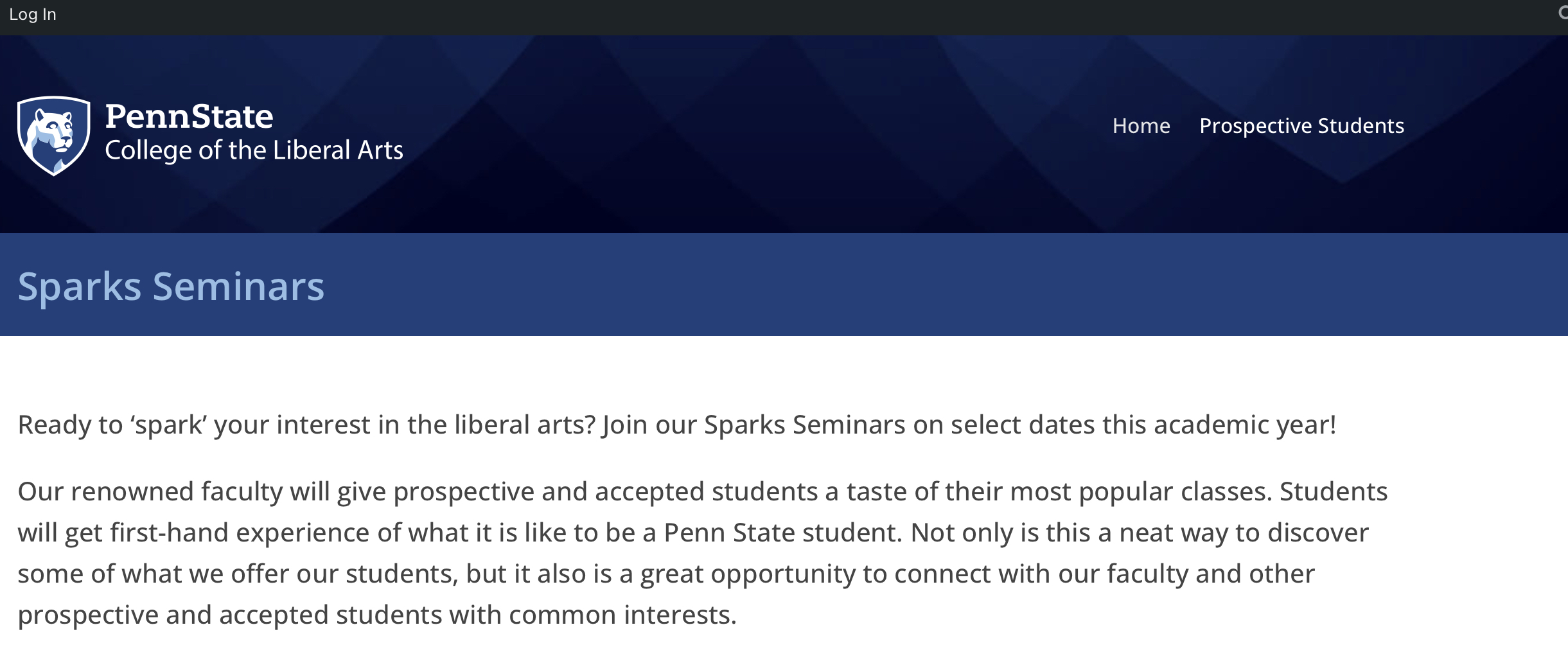
CAS Associate Professor Dr. Rosa Eberly delivered an invited College of the Liberal Arts “Sparks Seminar” to more than 300 accepted students and their parents on March 23 in Heritage Hall in the HUB-Robeson Center. The College of the Liberal Arts’ Accepted Students Program asked Eberly to tell students about CAS 222N / CIVCM 211N: Foundations of Civic and Community Engagement, a discussion-based interdisciplinary course she developed and started teaching in 2007.
After Eberly described the CIVCM Foundations Course, she addressed the question, “What are the foundations of civic and community engagement?” She then talked about the diversity of majors in the course and how students collaboratively discuss and address public problems. Public problems are problems that affect everyone, though they affect different people differently.

“Students bring their emerging disciplinary knowledge from their majors to the collaborative learning space of our classroom to address shared or common or public problems,” Eberly said.
“Some examples of the public problems that this semester’s CIVCM Foundations students have chosen to do research about, to analyze, to speak about, and to write about include inflation, child abuse, climate change, single-use plastics, gun violence, funding for mental health programs, the COVID-19 pandemic, and news illiteracy,” Eberly said. “This semester there are students from Nuclear Engineering, Biobehavioral Health, Chemical Engineering, Education and Public Policy, Global and International Studie
s, Supply Chain and Information Systems, Hospitality Management, Mathematics, Environmental Engineering, Journalism, Corporate Innovation and Entrepreneurship, and Kinesiology as well as Communication Arts and Sciences and other Liberal Arts disciplines.
Eberly said she was thrilled to highlight a few of the many student projects that came out of discussions in the CIVCM Foundations class and a few of the CIVCM capstone projects and theses that CIVCM students have completed.
CAS instructors offer six sections of the course each year. CAS 222N / CIVCM 211N is the only specifically prescribed course for the Intercollege Minor in Civic and Community Engagement, which has been housed in CAS since 2016 and which Eberly directs.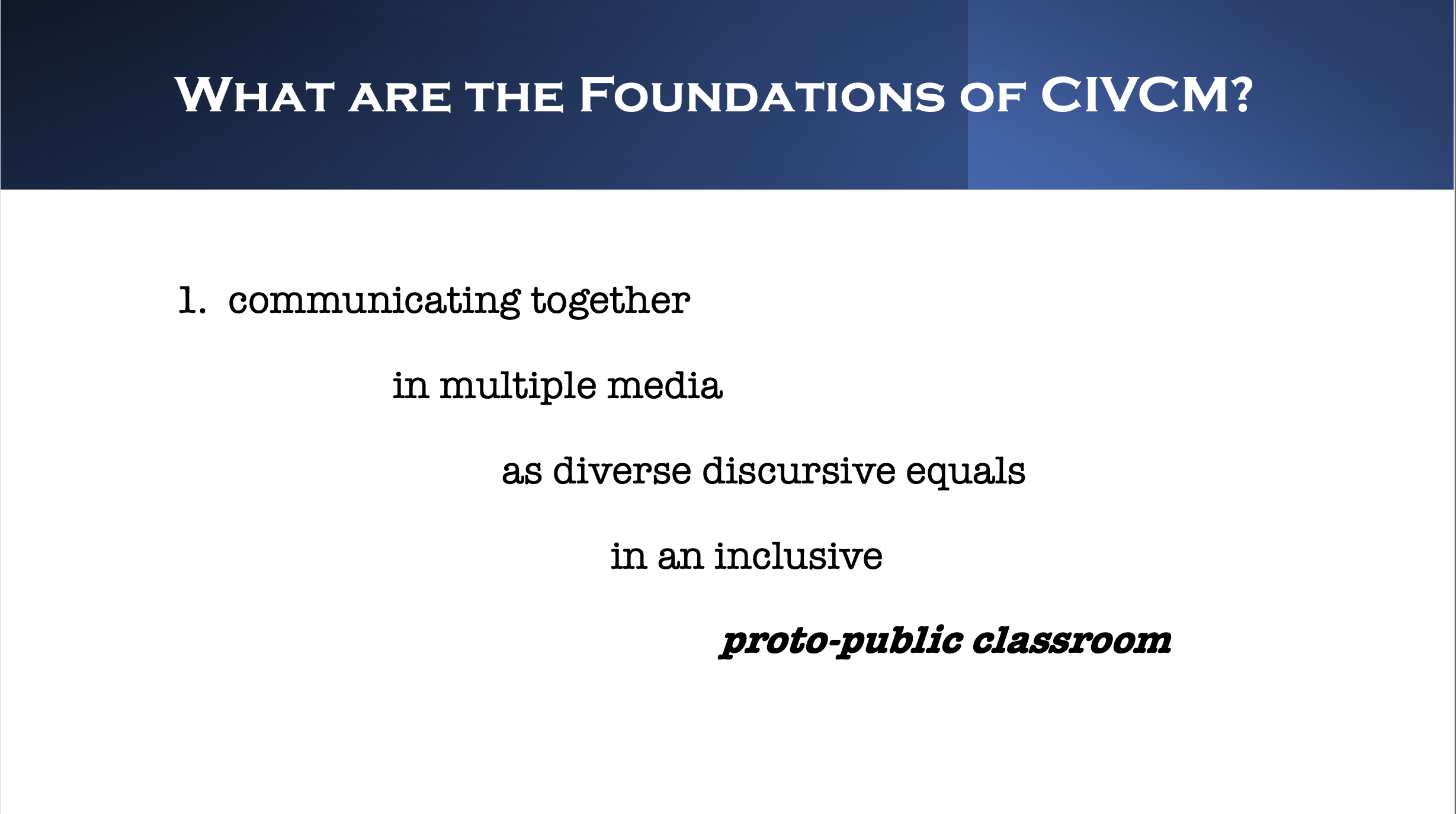
CIVCM student Vancie Peacock was featured in a video with President Neeli Bendapudi about the Dr. Keiko Miwa Ross Student Farm. Vancie has been instrumental in the farm’s mission and reach to educate peers about sustainability and where their food comes from. The farm also works to support students who are food insecure.
Vancie is a CIVCM Minor, a Schreyer Scholar, and Architectural Engineering major who is “passionate about the intersections between sustainable food systems and social justice.” She developed and taught a Students Teaching Students course during Fall 2023 about agriculture, food production, and sustainability.
CIVCM minor and UPUA Vice President Giselle Concepcion was recently featured on the Penn State Daily Collegian’s inaugural podcast. In the podcast, Giselle and UPUA President Nora O’Toole discuss their paths to leadership roles, explain the function of UPUA, and the challenges they anticipate.
Nevins Fellow Camryn Wilson is part of Penn State’s Intercollege Minor in Civic and Community Engagement. This post is an adaptation of her capstone project for CAS 496, directed by Dr. Rosa Eberly. Camryn compared civic ambassador programs in Texas and Connecticut and created an outline of what a program in Pennsylvania could look like.
I like to define civic engagement as the connections people have with their communities and the ways in which citizens actively participate in making a difference in issues of public conern by using their education, values, and skills. Additionally, civic engagement can take many forms such as volunteering, service-learning, electoral participation, working in government, and activism.
A civic ambassadors program is an exceptional way for states and the communities to increase awareness, participation, and engagement among citizens. These programs allow ordinary people to be leaders in their own communities, while making the civic health of their state better. Implementing civic ambassadors programs in every state would be beneficial to participatory democracy across our nation.
Currently, Connecticut, Texas, and Nebraska have civic ambassadors programs. For my capstone project for my civic and community engagement minor, I chose to compare the Connecticut Civic Ambassadors Program to the Texas Civic Ambassadors Program. I worked directly with the Connecticut Civic Ambassadors Program during my Nevins Fellowship with Everyday Democracy.
The goal of each civic ambassador is to reinforce community connection through engagement, community dialogues, and beneficial projects. By organizing and participating in these activities, civic ambassadors also benefit personally.
I thought it would be interesting to compare the Connecticut and Texas programs to see what is similar and different about each and how successful each program proves to be. In doing so, I hoped to gain knowledge and insight on how a civic ambassador program could be implemented in Pennsylvania. Implementing similar programs in every state would be beneficial to participatory democracy across our nation.
Connecticut
The Connecticut Civic Ambassadors program was launched in 2017 by Everyday Democracy and Denise Merill, Connecticut’s Secretary of State. The Connecticut Civic Ambassadors become “non-partisan catalysts of change.” The ambassadors are people who want to “build a movement for civic renewal in Connecticut” and who care about and engage others in their community by creating opportunities for civic participation.
They engage with their own communities by sharing civic health information and ideas through speaking, organizing, and/or volunteering at events or at various institutions/organizations. The ambassadors are able to gain a better understanding of the issues that are affecting their communities from the residents who live there.
The Connecticut Civic Ambassadors also participate in workshops, webinars, and the annual Civic Ambassadors Summit where there are opportunities to “learn more about civic health, learn from one another, leverage and build resources/partnerships, share success stories and challenges, increase the visibility of each Ambassador’s work, and build a movement for civic renewal in Connecticut.”
The Connecticut program allows its participants to devote as little as one hour per week to their work as an ambassador, which makes it easy for an average person to be an ambassador. The Connecticut Civic Ambassadors Program is “open to any Connecticut resident who believes that engaging others in their community and public life strengthens the civic health of the state and promotes community well-being.”
People of any age can be Connecticut Civic Ambassadors and they are able to remain in the program for as long as they like. Anyone can apply and all are accepted to become ambassadors.
Texas
The Texas Civic Ambassadors Program was established in 2016 through the Moody College of Communication at the University of Texas at Austin. This is a one-year program that focuses on service learning and leadership for college students. During the year, the Texas Civic Ambassadors will “help to enhance civil dialogue or civic engagement on their campus or in their community.” Although it is based at one university, students from any college or university in Texas are allowed to become Texas civic ambassadors.
Throughout the year, ambassadors are required to complete an independent educational outreach project, attend leadership development workshops, and conduct nonpartisan or bipartisan outreach activities. They also receive a plethora of information, opportunities, and support throughout their time serving as ambassadors, both from the Annette Strauss Institute and faculty at their respective university/college.
The University of Texas at Austin hosts a 3-day Texas Civic Ambassadors Leadership Summit in which they learn how to and begin developing ideas and draft plans for outreach and events. In order to be a Texas Civic Ambassador, one must be a college student in the state of Texas, attend the summit and other events, host activities, and complete journal entries. The applications are open from March to June and not everyone is accepted into the program.
Comparison
I compared the programs in the following areas:
- application process
- time commitment
- responsibilities/benefits
- types of projects
- demographics
Both programs had some similarities and differences in these areas, which can be see from the above descriptions. There are also fundamental differences between the programs that I think are important to highlight.
First, the Connecticut program seems to be more informal, while the Texas program seems to be more formal. This observation comes from the different requirements for the Ambassadors and the amount of enforcement that is put on those requirements, as well as what the Ambassadors personally receive from being part of the programs. While the Connecticut program allows its Ambassadors more freedom and flexibility in what they are required to do, the Texas program is stricter with its requirements.
Second, the Connecticut program is more activist-based and the Texas program is more educational. This observation comes from the fact that the Connecticut Ambassadors become agents of change in the state, while the Texas Ambassadors focus on service learning and leadership, while completing an educational outreach project.
I think both programs are successful and powerful for their states in their own ways. The Connecticut Program has provided opportunities for people doing great civic work to have a title and recognition for that work. The Texas Program provides learning opportunities and life-long civic skills to its Ambassadors so that they can continue to do civic work after their time serving as Texas Ambassadors is finished.
Implementation in Pennsylvania
My vision for the Pennsylvania Civic Ambassadors Program is a mixture of characteristics of both the Connecticut and Texas Civic Ambassadors Programs. I believe that following the example of Texas might be the best way to implement a civic ambassadors program in Pennsylvania.
Pennsylvania Civic Ambassadors could do a number of activities. Since the program would be open to students in higher education only, the Ambassadors could work to get the student voting numbers up by hosting educational events about voting and tabling for voter registration. They could also work to institutionalize voter registration on their campuses.
Additionally, Pennsylvania Ambassadors could be involved in student government activities, host social justice events, and create materials for students about civics, government, and service. One final thing that I think would be important for Civic Ambassadors to do would be to participate in service-learning opportunities, such as alternative break programs and days of service.
Penn State could be the perfect university to be the hub for the Pennsylvania Civic Ambassadors Program. The McCourtney Institute for Democracy, The Center for Character, Conscience, and Public Purpose, and the Intercollege Minor in Civic and Community Engagement make the university a great host for the program. The size of the Penn State community, as well as the existence of commonwealth campuses also work to the advantage of Penn State.
MEDIA, Pa. — For a recent Penn State graduate, community service and work-study programs provided an enriching experience and the opportunity to apply knowledge and skills gained in the classroom.
Bobby Kiefer, who attended Penn State Brandywine, graduated in December with a bachelor’s degree in communications and minors in business and civic and community engagement. During his senior year, he completed an internship at the campus’ Center for Ethics and Civic Engagement and worked at the Providence Animal Center through the community-based federal work-study program.
Kiefer began working with the Center for Ethics and Civic Engagement as a communications intern in the summer of 2019, creating the center’s initial website, helping with social media, and supporting community programs. He continued those efforts into the fall semester through the federal work-study program.
Also in the fall, he began working at the Providence Animal Center through the community-based federal work-study program, which is coordinated by the Center for Ethics and Civic Engagement. The program allows eligible students to receive financial support while working off-campus with Brandywine’s community partners, including schools, nonprofit organizations and public service agencies.
“I liked working for both the Center for Ethics and Civic Engagement and the Providence Animal Center because they were different,” he said. “Providence was more on the creative side. I was writing bios for the animals from their perspective, so it allowed me to be super creative and different.”
“And then on campus, it was more academic focused, gathering information about what was going on at the center and compiling that in a more formal way,” he added, “so it was cool because I had two different experiences, one more creative and one more professional.”
Vippy Yee, Rosenberg Director of the Center for Ethics and Civic Engagement, was impressed by Kiefer’s commitment and his ability to learn quickly.
“I didn’t have the capacity to create the website without his writing skills, his willingness to learn the technology, and his great attitude toward work and the work of the center,” Yee said. “He’s super dependable, and the issues I asked him to research were not only well researched, but he also had the ability to effectively communicate.”
Kiefer said the benefits of his internship and community-based federal work-study experience were many.
“I definitely gained a lot of connections and an understanding of networking,” he said. “And I got to actually apply those concepts that I learned in class. I got to use the skills, such as understanding who you’re writing for and why you’re writing it. And it felt like more of a real-world experience.”
Yee said Kiefer will be an asset to any future employer.
“He developed into an employee who was able to effectively demonstrate his skills in a workplace setting,” she said. “He’s a great ambassador for our campus. That’s part of what the federal work-study can be — an example of Penn State students at their best, applying what they are learning in the classroom in real professional settings.”
Students in Arto Woodley’s spring 2015 CIVCM 211: Foundations of CIVCM course at Penn State Brandywine explored connections among civic movements, communities, and American democracy through readings, videos, and essay. They learned what it means to be civically “engaged” and how movements have shaped the democracy, as we know it, in the United States. Teams of students synthesized and applied their learning through final projects and by presenting implementation plans that aimed to improve the civic engagement of Brandywine students. Grounded in the class readings and class discussions, students formulated initial ideas and hypotheses, then researched the feasibility and potential impact of their plans by conducting interviews with fellow students as well as administrators and key personnel. Student also investigated what other Penn State campuses are already doing in regard to civic engagement.
Team Democracy members Kevin Pistiner, Daniel Robinson, Rebecca Jones, Tasneema Ahmed, and Peter Conboy developed a plan for a “Questioning” Politics Political Game Show at Penn State Brandywine. The team found that in 2010, only 24% of graduating high school seniors scored proficient or advanced in civics. The team presented a video documentary in which they interviewed students about their knowledge of current politics, asking questions such as, “How long is the term of a governor?” The documentary was powerful in supporting the idea that students need more ways to engage in civics, be more aware of those who serve as their government representatives, and participate in political elections. Their aim was to actively engage students in current events, political affairs, and encourage political discussions among students. Their idea was to hold two campus wide “Questioning” Politics Political Game shows per year, one prior to the primary election (April 21) and one prior to the general election (October 27). A committee of three interested students and one professor would develop the questions, promote the show through email, campus flyers, campus digital screens, and Facebook, and work with campus faculty, student clubs, and others to recruit four teams of students for the event. The campus community will be invited to cheer on their favorite teams and hopefully learn more civics facts.
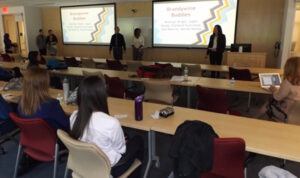 The Brandywine Buddies Team, Shannon Wright, Logan Woods, Diamond Gatewood, Josh Mancini, and Moriah Nemia, saw the need for first-year Brandywine students to build community on campus from the start by assisting those students with “Buddies” who will help them form a network and become active members of the Penn State community. Sophomores, juniors, and seniors could apply to be a Buddy. The initial Buddy selection process would include an application and an interview. Selected Buddies would be required to participate in online mentor training and enroll in a one credit course. Each Buddy would then be assigned 10-15 first-year students. The groups would be as diverse as possible to promote cross cultural partnerships. Buddies would engage first-year students in fun activities and competitions to encourage unity and inclusiveness, such as a “BB” color war throughout the semester and point-based competitions to encourage involvement. Incentives could include a pizza party and certificates of completion to all participating members. The desired benefits for first-year students include: networking, establishing career interests, promoting inclusiveness and event involvement. Buddies would benefit in many ways as well, as they would build leadership skills, develop inside knowledge of campus activities, network with students they might not otherwise, learn about internship opportunities, and add to their resume.
The Brandywine Buddies Team, Shannon Wright, Logan Woods, Diamond Gatewood, Josh Mancini, and Moriah Nemia, saw the need for first-year Brandywine students to build community on campus from the start by assisting those students with “Buddies” who will help them form a network and become active members of the Penn State community. Sophomores, juniors, and seniors could apply to be a Buddy. The initial Buddy selection process would include an application and an interview. Selected Buddies would be required to participate in online mentor training and enroll in a one credit course. Each Buddy would then be assigned 10-15 first-year students. The groups would be as diverse as possible to promote cross cultural partnerships. Buddies would engage first-year students in fun activities and competitions to encourage unity and inclusiveness, such as a “BB” color war throughout the semester and point-based competitions to encourage involvement. Incentives could include a pizza party and certificates of completion to all participating members. The desired benefits for first-year students include: networking, establishing career interests, promoting inclusiveness and event involvement. Buddies would benefit in many ways as well, as they would build leadership skills, develop inside knowledge of campus activities, network with students they might not otherwise, learn about internship opportunities, and add to their resume.
Team Equality members Jordan Beeche, Daniells DeMito, Shannon Matthews, Dahlia Quiroz, and Shelby Wright felt that having a web-based, campus-wide calendar of events readily available and visible from all computers on campus would encourage greater student participation in campus events. To come to this conclusion, students in this team interviewed personnel from Brandywine Student Affairs, the ITS department, and the Civic and Community Engagement Lab, and conducted an extensive survey of Brandywine campus students. Survey data (N=100) revealed that 92% of students attended either one or no campus events during Common Hour throughout the week—the time that most events are scheduled. Some of their reasons for non-involvement included: having to go to work, weren’t interested, complete homework during common hour, and unaware of events. Since 64% of respondents said they would be more involved if they could access information about club meetings or campus events in one area, this team focused on how to increase awareness. The team found that their idea for a central calendar was already in the works by the Brandywine ITS department. The team then made suggestions of ways to make the calendar more central, such as making it visible on all digital display monitors and on every campus desktop computer screen as the background wallpaper that students would see as they log on to use the computer.
Gretchen Shaffer (Senior, Plastics Engineering Technology) is currently serving as the CIVCM Ambassador for the PSU Behrend campus. During her tenure as ambassador, Gretchen has worked to increase the visibility of the CIVCM minor through a variety of means, including digital signage campaigns, meeting with prospective students, and offering presentations in classroom and extracurricular settings. Gretchen serves as a liaison between CIVCM students and faculty members, assisting with practical matters such as arranging meetings and establishing lasting organizational frameworks and channels of communication. She is also tasked with recruiting for the minor, efforts that have translated into increased enrollment in CIVCM course offerings and greater numbers of students formally declaring their affiliation with the minor.
Outside of her work with the CIVCM Ambassador program, Gretchen also serves on the Executive Board of Alpha Phi Omega (a national service fraternity), and is a member of Alpha Sigma Tau, as well as “Random Acts of Kindness,” a PSU campus philanthropic organization.
